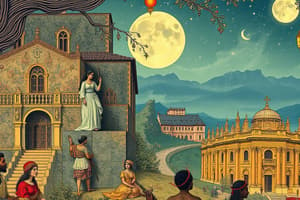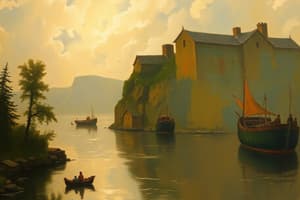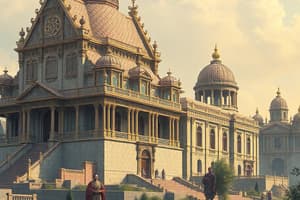Podcast
Questions and Answers
When did World War I start and end?
When did World War I start and end?
- 1941 to 1945
- 1914 to 1918 (correct)
- 1939 to 1945
- 1918 to 1922
What event triggered the start of World War I?
What event triggered the start of World War I?
- Signing of the Treaty of Versailles
- Assassination of Archduke Franz Ferdinand (correct)
- Battle of Stalingrad
- Unconditional surrender of the Axis powers
Which country dominated a significant part of the world through colonialism?
Which country dominated a significant part of the world through colonialism?
- Germany
- United States
- Spain
- France (correct)
Who became the chancellor of Germany before the start of World War II?
Who became the chancellor of Germany before the start of World War II?
Which war ended with the Treaty of Versailles imposing heavy reparations on Germany?
Which war ended with the Treaty of Versailles imposing heavy reparations on Germany?
Which empire aimed to spread Christianity and Western civilization?
Which empire aimed to spread Christianity and Western civilization?
During which period did modern India gain independence from British rule?
During which period did modern India gain independence from British rule?
Which ancient civilizations are known for their monumental achievements in arts, science, and technology?
Which ancient civilizations are known for their monumental achievements in arts, science, and technology?
Which period marked a major turning point in human history with a revival of learning based on classical sources?
Which period marked a major turning point in human history with a revival of learning based on classical sources?
What motivated empires to expand, including the desire for natural resources and markets?
What motivated empires to expand, including the desire for natural resources and markets?
Flashcards are hidden until you start studying
Study Notes
World Wars
The World Wars, specifically World War I and II, were significant events in modern history. They had far-reaching impacts on global politics, economies, and social structures.
World War I, also known as the First World War or the Great War, lasted from 1914 to 1918. It began when Archduke Franz Ferdinand of Austria was assassinated by Gavrilo Princip, a Bosnian Serb nationalist. This event ignited the tensions between the major European powers, leading to a devastating global conflict. The war ended with the Treaty of Versailles, which imposed heavy reparations on Germany and redrew Europe's map.
World War II, starting in 1939 and ending in 1945, was even more destructive. It started after Adolf Hitler became chancellor of Germany and began invading neighboring countries, violating the Treaty of Versailles. The war culminated in the Battle of Stalingrad, considered one of the turning points. The war ended with the unconditional surrender of the Axis powers, followed by the Nuremberg trials.
Colonialism
Colonialism refers to a system in which a country dominates a weaker country or territory, often through the use of force. The age of colonialism began in the late 15th century and lasted until the mid-20th century. The major European powers, including the United Kingdom, France, and Spain, established colonies around the world.
The British Empire was the largest global empire in history, spanning all continents except Antarctica. It reached its peak extent in 1922. The empire was motivated by economic interests, including the desire for natural resources and markets. It also aimed to spread Christianity and Western civilization.
The French Colonial Empire was the second largest empire. It was characterized by the mission civilisatrice ("civilizing mission"), justifying imperialism as a means to "civilize" and "civilize" non-European peoples.
The Spanish Empire was the first global empire, establishing extensive territories in the Americas, Asia, Africa, and Oceania. The empire was built on the conquest and enslavement of indigenous peoples.
India
India has a rich history that spans over 5,000 years. It is often divided into three main periods: ancient India (3300-1000 BCE), medival India (1000-1600 CE), and modern India (1600-present).
Ancient India was characterized by the rise of kingdoms and empires, including the Maurya and Gupta Empires. It was during this period that Hinduism, Buddhism, and Jainism developed.
Medieval India saw the rise of local kingdoms, such as the Delhi Sultanate and the Vijayanagar Empire. It was also marked by the arrival of Islamic and European traders.
Modern India began with the arrival of the British in 1757. The British East India Company gained control of India and established a colonial government. India gained independence from British rule in 1947, becoming a republic in 1950.
General History
General History encompasses a wide range of topics and periods, from ancient civilizations to contemporary events. It often focuses on the study of past events, their causes, and their effects.
Ancient Civilizations include the Egyptians, Greeks, Romans, Chinese, Indians, and Persians. These civilizations are known for their monumental achievements in arts, science, and technology.
Medieval Europe is often characterized by feudalism, the Crusades, and the emergence of the first nation states. It was a period of significant religious, cultural, and political change.
The Renaissance, which began in Italy in the 14th century, marked a major turning point in human history. It was characterized by a revival of learning based on classical sources, the development of linear perspective in painting, and gradual but widespread educational reform.
The Enlightenment, which started in the 18th century, was a period of great intellectual and philosophical change. It was characterized by a shift from religious to rational ways of thought.
The Industrial Revolution, which began in Britain in the late 18th century, transformed the world. It was characterized by the mechanization of industry and the growth of factories.
The Cold War, which lasted from the end of World War II until the collapse of the Soviet Union in 1991, was a period of geopolitical tension between the Western Bloc (led by the United States) and the Eastern Bloc (led by the Soviet Union). It was marked by a lack of direct armed conflict between the two superpowers.
Contemporary History covers events from the end of the Cold War to the present day. It includes the rise of globalization, the War on Terror, and the ongoing climate crisis.
Studying That Suits You
Use AI to generate personalized quizzes and flashcards to suit your learning preferences.




